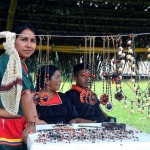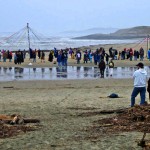As I drove my mom’s car South from her home towards my son’s winery, I enjoyed the beauty of Eastern Washington while my mom read articles to me from the collection I’d recently added to Pocket. I didn’t expect her to be interested in the Pagan articles, but she surprised me by reading Echoes of an Older God, a post about Arthur as a Pagan deity. As she read that post and we drove through miles of wide open American land, my thoughts wandered off to the problem of colonialism, empire builders, and cultural destruction. It dawned on me that the Europeans who came to America and were blind to the cultures that they were destroying here were the descendants of people who had gone through the same experience themselves. It happens again and again, in waves.
We’ve written about the problem of “nativeness” on this blog before. We’ve discussed the issues around identity and place, cultural appropriation versus borrowing, and the question of who we are as displaced people. Eleanor has said something to the effect of, “(Neo)Pagans are displaced people.” Maybe all people are displaced people, but Neo-Pagans sit with the displacement in a particular way. It’s not the same displacement experience as a Palestinian living in New York or an Ohlone living in modern Oakland.
What ran through my mind as I listened to the post about Arthur and looked out at the rolling hills of the Palouse was how the cycle of cultural domination and destruction is similar to the cycle of domestic violence. Not everyone who is abused as a child grows up to be an abuser, but that cycle of violence is so common as to be expected. Over the years, I’ve given a lot of thought to how that cycle plays out with modern nation states dealing with cultural minorities, where a group that was once the underdog becomes the abusive party when they achieve dominance. The cycle is there with colonialism, too. Dog eat dog eat dog…
Power is achieved at the point of a sword and then turned against all others just to ensure that there is no return to vulnerability. The Romans moved into England and murdered, pushed out or washed out the local cultures to a greater or lesser extent depending on a whole raft of different variables. The English moved into America and murdered, pushed out and washed out the local cultures all over again. I’m not going to argue that the level murder and destruction in Roman-controlled England was equivalent to the horrors here in America. The Romans didn’t have the “advantage” of diseases that wiped out two thirds of the population ahead of their armies. But the psychological play of giving what has been gotten seems to ring true.
When we talk about cycles of domestic violence, there are many things that we have learned to help families end the violence. Have we developed a theory of healing for nations? How can we hope to end the violence against cultures if we don’t?
















